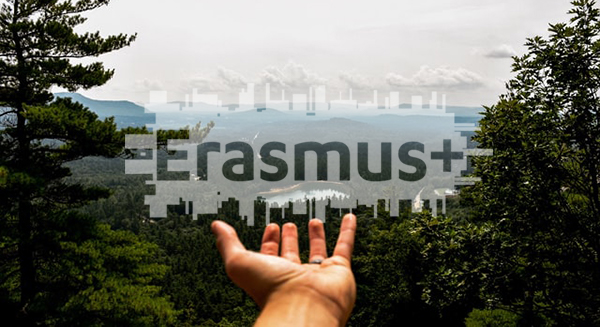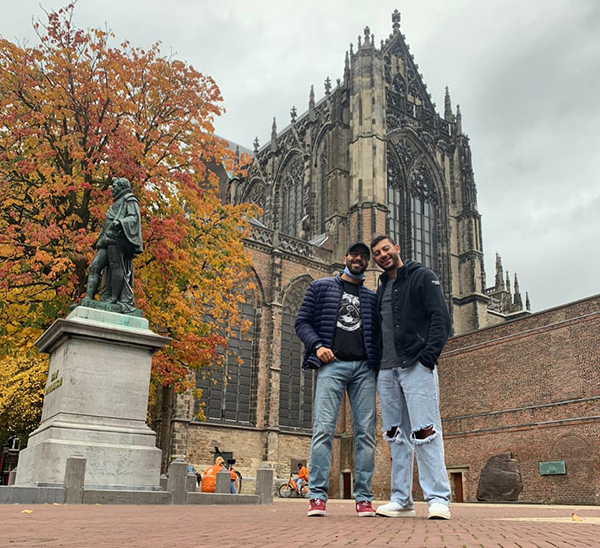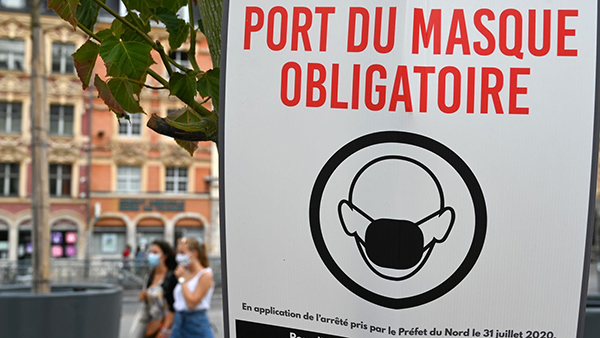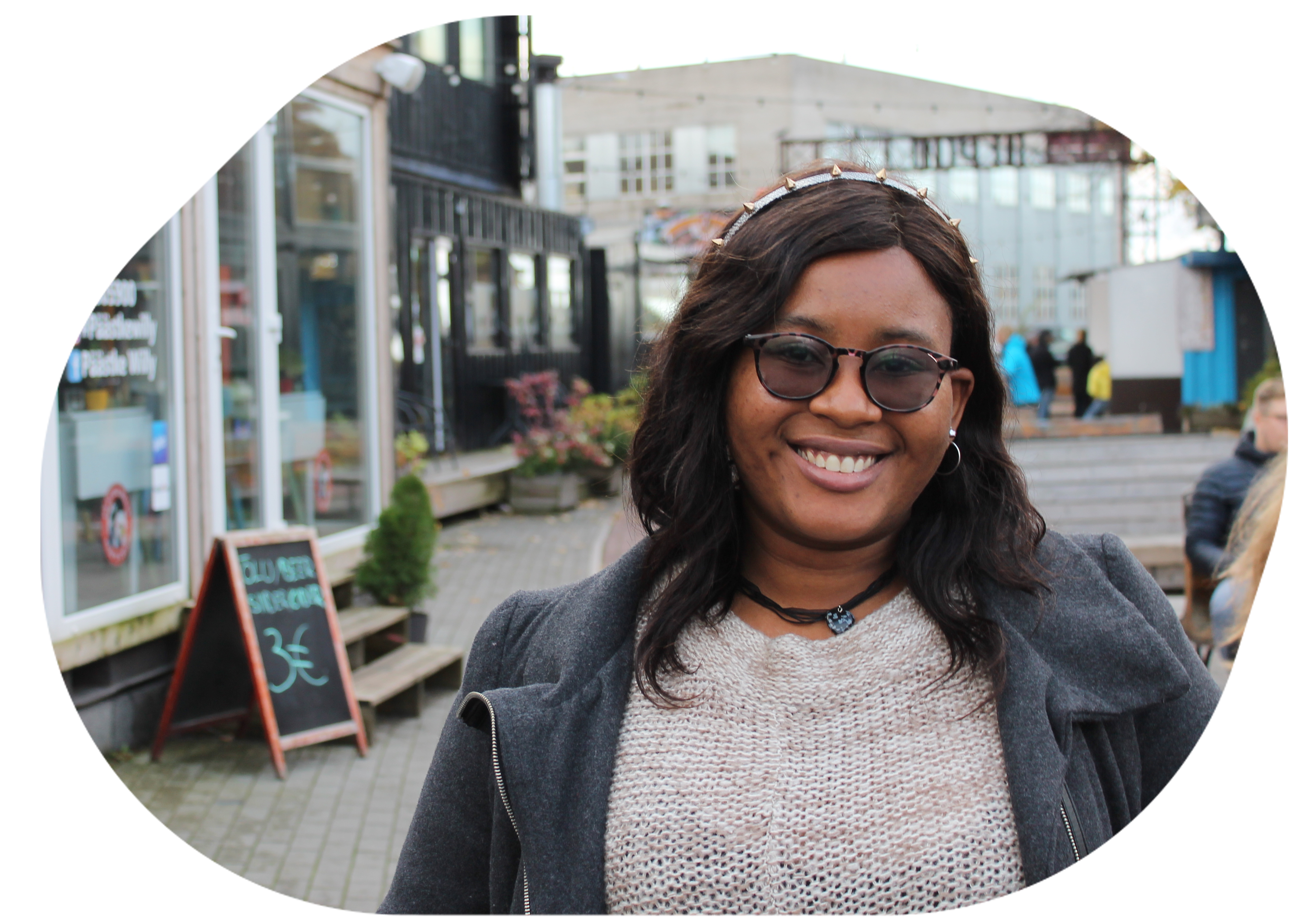Despite already being an international degree student, I am a huge advocate of the Erasmus+ exchange program. Seeing that I am currently on my exchange studies, I thought I’d share my experience with anyone interested in going on exchange from Estonia, especially during the current pandemic. Whether you are a prospective student in Estonia, or currently studying here, this article helps you understand what Erasmus+ is as well as familiarizing you with the procedures, what to expect and how to adapt. - Islam A.

Erasmus+: the world on the palm of your hand. Photo: Unsplash
Erasmus en Lille - Erasmus in Lille
Going on Erasmus was on my mind since day one of my studies at Tallinn University. The students in my program, International Relations, were well informed about the opportunities we have as students - such as scholarships, internship opportunities, and Erasmus+. As I wanted to work on my French language skills, I preferred to go to a university in a French-speaking country. All I had to do was browse our university’s website and voilà! All the partner universities were listed for my major and other majors. It was not hard to find. Following the steps I will outline at the end of this article, I was able to successfully submit my paperwork and go on my exchange.

Islam (left) in Lille, France. Photo: Islam
Clearly, now is not the best time to travel due to the global situation. However, we must also not get too stuck on “what could have been” and rather try to adapt. According to a report by Erasmus Student Network for the 2020 spring semester, universities unable to host students physically either canceled student admissions or allowed students to participate in distance learning (ESN, 2020). By the fall semester, many institutions were able to make the shift and expand their digital capacities to allow students to have online studies. In Estonia, this was not an issue for existing or incoming students. As a proud tech-country, most of the education institutions were able to make the digital shift smoothly due to their readiness and professional staff.
Though my exchange studies at Science Po Lille are carried out in hybrid form, with half the education on campus and the other half online, I was not spared the restrictions’ resurgence.
Corona adaptation
Before taking the final steps to go on my exchange, I asked myself: “When is the best time to travel? During the least expected time, during a pandemic!” Granted, there were many obstacles that appeared during the process and a lot of uncertainty. Though I must admit, Tallinn University’s and Science Po Lille’s staff have been more than flexible and understanding which made it even easier to participate in my exchange. Of course, the mobility experience is not only about studies, but about interacting, exploring, and learning. This is somewhat more difficult during a pandemic, but not impossible!

Sign in Lille requiring masks. Photo: Sky News
As long as I followed the necessary sanitary regulations, I’ve managed to explore as much as I could. So far, there are ups and downs to the situation, especially in France. We are experiencing a full lockdown, but this does not disturb the education I am receiving nor does it halt my relationships with people I have come to meet during my exchange. On the other hand, it opened my eyes to different ways of interaction and transportation. More importantly, to hygiene ethics - such as distancing oneself from others, the importance of being aware of what I touch, etc. Thanks to the experience I got from being an expat in Tallinn, my transition is, and continues to be adequate.
Adaptation x2
Adapting to the pandemic is not easy anywhere. The situation affects us all, doesn’t matter if we are at home or in another country. As an international student in Estonia, I already have the disposition for trying new experiences, so should all internationals who are living elsewhere. Thus, I comfortably add that adaptation is key. Not only if you decide to go on exchange, but so long as you are an international student.
Here are some words from our Study in Estonia Student Ambassadors on how they and their universities adapted compared to the previous semester:

Nkajima, University of Tartu: “This semester has pretty much been different from last. We’re operating a hybrid system; you have the option to come to class or connect online. While I don’t necessarily go for most physical classes, it’s great to have the option and I make sure to go every Friday to school and really get the feel of physical classes… I’m thankful I get to have a bit of a physical class experience”.

Anirudh, Tallinn University of Technology: “The ongoing semester has been nothing short of one mega roller-coaster ride. Post a rather lazy summer break, courtesy to the arrival of a pandemic situation, the fall semester started off in quite a flurry of excitement. My university quickly came up with newer, better, and safer ways to teach online. I can confidently say that I’ve learned a few skills like time management. Now that most of us are forced to stay inside, I have also found time to catch up on a few lost hobbies and reconnect with friends! I think I can say that as an international student, this semester, so far, has been life-changing”.
Step-by-Step Guide: What is Erasmus+ and what are the procedures?
Erasmus+ is the EU’s program to support education, training, youth, and sport in Europe (as well as other partner countries). It is designed for students, individuals and organizations aiming to develop themselves. It enables you to access a variety of institutions across Europe, which in turn gives you the opportunity to gain even more knowledge and international experience, meet new people, and see the world!
To go on Erasmus, there are some steps that you need to undergo to make your exchange happen. Keep in mind, Erasmus+ is meant to make student’s mobility easier. Hence, don’t stress about the difficulties. You will get help from your university’s coordinators, the hosting university’s coordinators, and financial support from the European Commission. Take a look at the following steps:
- Check with your university if they are part of the Erasmus+ program
Most Estonian universities offer exchange opportunities to their students. If your university offers an exchange, then you’re good to go. - Check your university’s requirements
Most universities have a minimum GPA requirement for you to be able to qualify for Erasmus+ exchange. If your grades meet the requirement, you may proceed. - Explore your options
If your university offers exchange opportunities, then they have a list of partner universities in their directory. Your exchange coordinator should be able to guide you to it. Each partner university can in turn have their own requirements, so make sure you understand those requirements and also check that the university meets your expectations. - Preparing your documents
After you have chosen a university for exchange with your coordinator, you will need to select the courses you would like to take. This means some thorough surfing on the host university website to understand what courses are available to you. Your coordinator will also provide you with a Learning Agreement to fill in, with which you will get nominated to the universities. Remember, getting accepted depends on the number of students applying from your home university as well as the hosting university’s capability of hosting you. - After acceptance
After being accepted to the nominated university of your choice, you should start preparing for your mobility!
It is an experience of a lifetime. Not unlike being an international in Estonia, though every country is different and has much to offer. The more you explore, the wider your view will be on education, travel, and, if I may say so, life.
If you have the opportunity to go for Erasmus+ exchange, I highly recommend it. You should be able to find all the needed information on your university’s website. If you are a prospective student and would like to know more about the opportunities provided by different universities in Estonia, simply check their websites or contact their information center. If you are a current student, what are you waiting for? Browse your school’s website or contact your mobility coordinators!
Still unsure of whom to contact or have specific questions regarding Erasmus+? Feel free to reach out to us Study in Estonia Ambassadors and we’ll help!
Text by: Islam Aboulela
